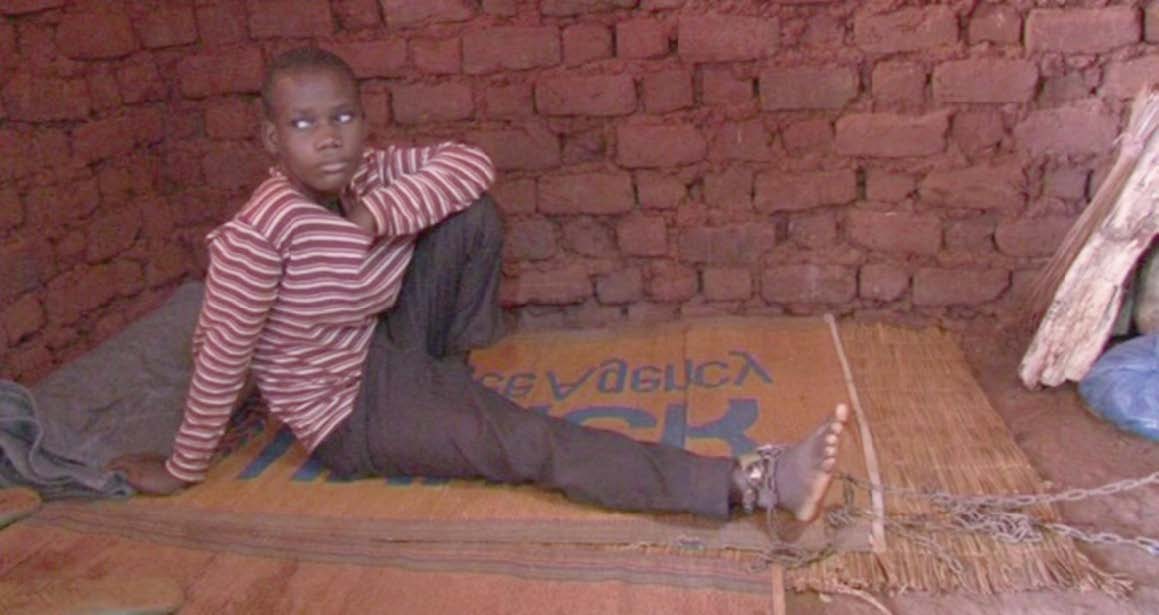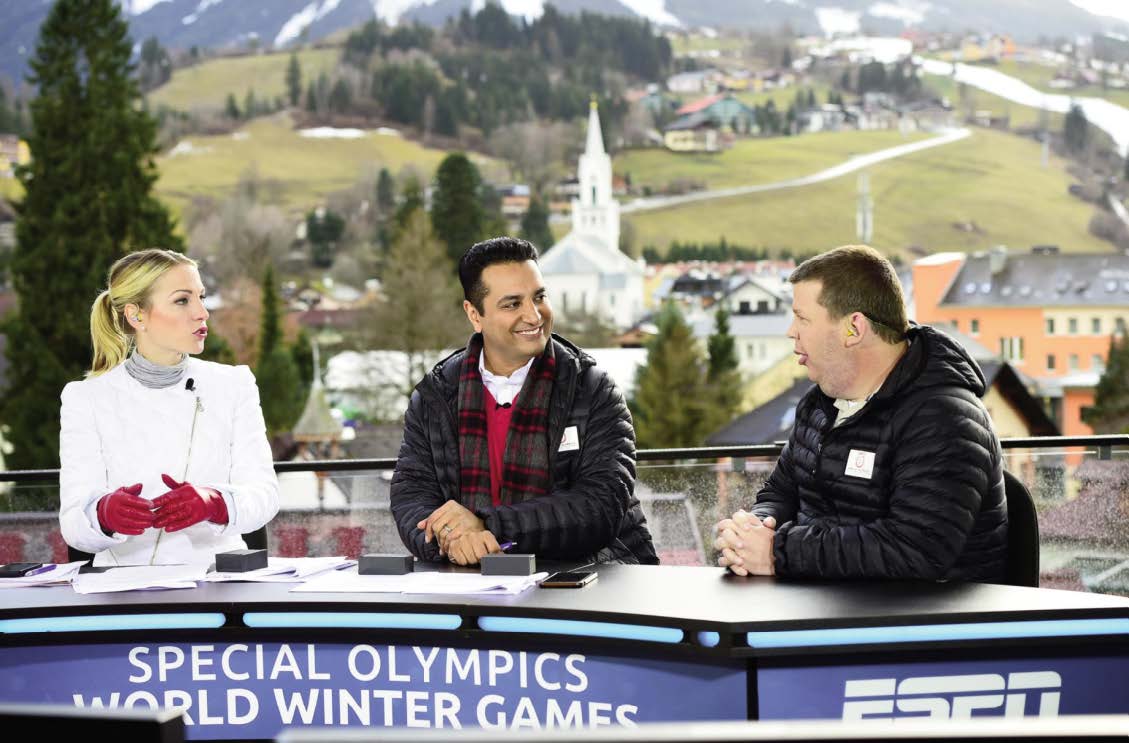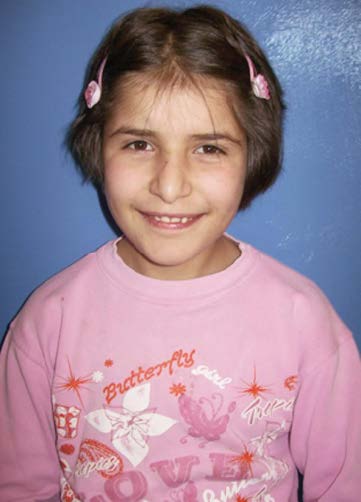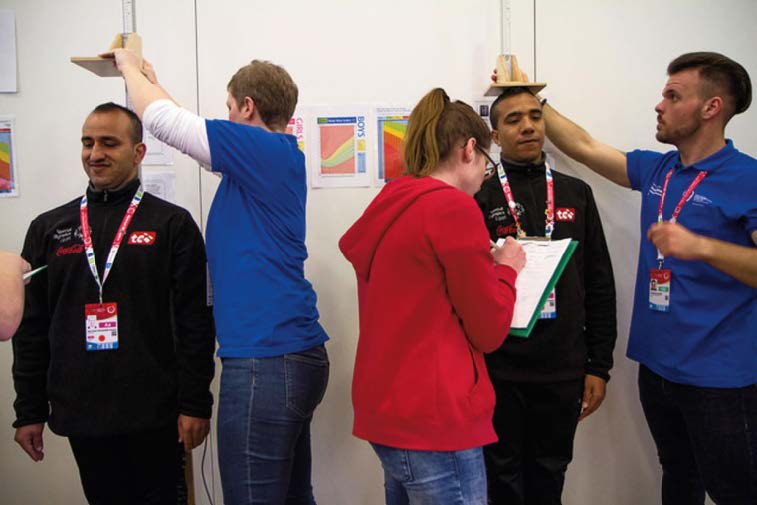
Special Olympics has found that people with intellectual disabilities are being excluded from national laws and policies in countries around the world.

WORLDS APART: Dustin Plunkett (above right) now is a sports analyst for ESPN. He credits Special Olympics for saving his life; Malaki (opposite page) and other people with ID are treated inhumanely around the world.
To the rest of the world, human rights are assumed and not questioned. Special Olympics fights for people with intellectual disabilities (ID) to obtain the same human rights as everyone else. Human rights are defined as universal freedoms and entitlements all human beings share, whatever their race, nationality, place of residence, sex, gender identity, sexual orientation, national or ethnic origin, color, religion, language, political belief or any other status such as "intellectual disability". Human rights protect the values of all people with intellectual disabilities, such as equality and dignity, in many areas: civil (e.g., voting), political (e.g., participating in government), economic (e.g., working), social (e.g., accessing health care facilities and goods) and cultural (e.g. enjoying the benefits of sports, play and scientific progress). Based on governmental agreements, human rights are granted to all persons (with or without intellectual disabilities). These rights are enforced by large governing bodies like the United Nations, the European Union or national human rights commissions.
Special Olympics has found that people with intellectual disabilities are being excluded from national laws and policies in countries around the world. Some of the most serious infractions are involuntary admissions of people with ID to mental institutions, lack of protocol of decisionmaking processes in medical situations, and a lack of health workers who have the knowledge to treat patients with ID. Dustin Plunkett, a Special Olympics athlete from California, grew up with constant oral health problems. He remembers his gums swelling up at least once a month. Then, during the Special Olympics Southern California Summer Games, Dustin and his coach visited the Healthy Athletes tent. His dental screening revealed some serious problems with his teeth and gums and was referred for a follow-up appointment. He subsequently received a devastating diagnosis: oral cancer. Dustin underwent a difficult surgery to remove a tooth and an inch of gum, but he has since been cancer-free. Dustin credits Special Olympics with saving his life.
Another success story is Zuebeyde Horus. A Special Olympics athlete from Turkey, Zuebeyde was living with a serious heart condition, but her caretakers didn't know – until a volunteer doctor at Healthy Athletes discovered it. "We realized that she had a serious heart murmur, told her trainer that she should not participate in any other sports activity and should be referred to a cardiologist for echocardiographic imaging," said Dr. Erhan Sayali, a clinical director who organizes Medfest, one of eight Healthy Athletes disciplines, for Special Olympics Turkey.
Healthy athletes protects & promotes the human rights of people with iD by giving them access to health exams, referrals, & follow up care.
At a follow-up appointment, Zuebeyde was diagnosed with Atrioventricular septal defect. The condition is a hole between the various chambers and valves of the heart which causes abnormal blood flow and forces the heart to work much harder than it normally would. This type of defect is closely associated with intellectual disability; it is estimated that 45 percent of children with Down syndrome have some type of congenital heart disease. Zuebeyde underwent life-saving surgery within days of being diagnosed. "Treatment effectively doubled or tripled Zuebeyde's life expectancy — adding 20 to 40 years of life," said Dr. Matthew Holder, Global Medical Advisor for Healthy Athletes. "I hope other Programs will be inspired by this success." This success story is made even more compelling, given that these defects are relatively easy and inexpensive to detect. Zuebeyde's condition was discovered simply by listening to her heart with a stethoscope.


HARD-FOUGHT VICTORIES: (Above left) Zuebeyde Horus, a Special Olympics athlete from Turkey, underwent life-saving surgery within days of being diagnosed by a volunteer doctor at Healthy Athletes; (Above right) Teammates from Special Olympics Egypt get screened at a Healthy Athletes event. When people like Dustin and Zuebeyde are healthy and pain free, they are able to exercise their most fundamental human rights and freedoms.
By giving people with ID access to health exams, referrals, and follow up care, Healthy Athletes protects and promotes the human rights of people with ID. When people with ID, like Dustin and Zuebeyde are healthy and pain free, they are able to exercise their most fundamental human rights and freedoms: their right to practice sports, to cultural life, to recreation, to inclusive education, to work, to equality, to life, to equal protection, to privacy, and informed consent. There is a constant relationship between the exercise of these human rights and the health of athletes who participate in the Healthy Athletes Program.
Stories like Dustin's, Zuebeyde's and many others can influence health authorities and private health providers in other countries to expand their health services not only to athletes of Special Olympics but also to other people with intellectual disabilities who are still excluded from the health systems due to stigma and discrimination; restrictive policies and laws, and a lack of health workers who have the knowledge, training and experience in the field of intellectual disability.
Special Olympics works with global institutions and organizations such as the World Health Organization (WHO) to ensure that people with ID receive the same basic human rights as every other person on Earth. Special Olympics will continue to act as a catalyst for the human rights of people with ID. To promote the strengthening of these human rights, Special Olympics is training health professionals on methods that protect this population. Special Olympics is including human rights information in video training modules and online courses which are being developed by Healthy Athletes disciplines in dentistry, podiatry, optometry, physical therapy, audiology, and other key areas.
Special Olympics is also sharing its data with international governing bodies to influence policy and legislation changes to benefit people with ID. With these actions, Special Olympics fights to secure basic human rights of all people with disabilities across the world in a manner consistent with the United Nations Convention on the Rights of Persons with Disability.